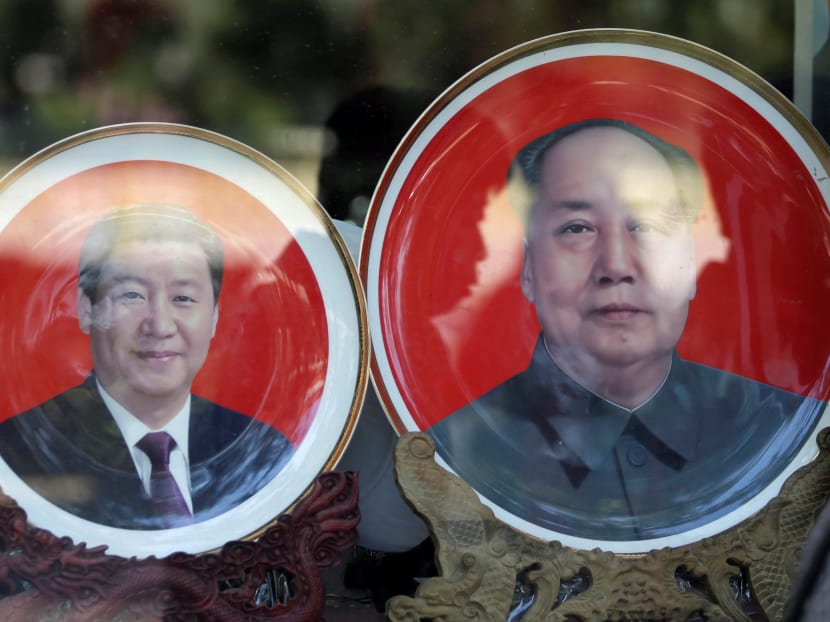Xi charts his path as China’s new revolutionary hero
At their first meeting in April, China’s president Xi Jinping tried to warn his United States counterpart about how dangerous a confrontation with North Korea would be.

Souvenir plates with images of Chinese late Chairman Mao Zedong and Chinese President Xi Jinping are displayed for sale at a shop next to Tiananmen Square during the ongoing Communist Party congress. Mr Xi is now regarded as China’s great centraliser and most powerful ruler since Mao. Photo: Reuters
At their first meeting in April, China’s president Xi Jinping tried to warn his United States counterpart about how dangerous a confrontation with North Korea would be.
“We have fought them many times over the centuries,” Mr Xi told Donald Trump, according to those briefed on their conversation. “There were terrible casualties on both sides.” Mr Xi, 64 and embarking on his second five-year term as leader of China’s ruling Communist party, was referring to the periodic wars between various Chinese empires and Korean kingdoms as far back as the fourth century BC.
The lesson, and Mr Trump’s other interactions with China’s president, left a deep impression. “He’s so smart,” Mr Trump later said. He also describes Mr Xi as “tough”. Smart, tough, calculating and deeply versed in history — these traits, demonstrated over the past five years by Mr Xi, have helped delineate a man now regarded as China’s great centraliser and most powerful ruler since Mao Zedong, the party’s revolutionary hero. In private Mr Xi intimidates his peers with long silences and “this face that doesn’t move, never smiling”, as one person who has observed him in meetings puts it.
His public image is also stern, a man popular with the masses because of an anti-corruption campaign that has devastated the party’s upper ranks.
But the cult of personality created by the party’s propagandists also presents him as a warm character, sometimes referred to as Xi Dada or Uncle Xi, who is familiar with the struggles of ordinary Chinese. Before Mr Xi assumed power in November 2012, the world knew little about him. What was known was that he and his father, a high-ranking Communist official and vice-premier under Mao, both suffered during the Cultural Revolution.
The elder Xi was purged and imprisoned; his son joined tens of millions of other “sent-down” youth labouring in impoverished villages across the country. Mr Xi’s father was later rehabilitated by Deng Xiaoping, the architect of China’s economic “reform and opening” programme, and became a member of the party’s politburo in the mid-1980s.
Mr Xi, meanwhile, began his much more successful party career in 1982, as deputy head of a poor county in Hebei province.
Although this communist princeling would later marry one of China’s most famous singers and send their only child, a daughter, to Harvard, Mr Xi’s party hagiographers have played up his early experiences to present him as a man of the people. Earlier in his career, there were hints that Mr Xi, like most Chinese politicians, was a staunch nationalist. “There are a few foreigners, with full bellies, who have nothing better to do than try to point fingers at our country,” Mr Xi said on a visit to Mexico in 2009, when he was vice-president.
“China does not export revolution, hunger or poverty. Nor does China cause you headaches. Just what else do you want?” Over the past five years the world has also learnt that Mr Xi still believes deeply in the Communist party cause.
The three policies that have defined the Chinese president’s first term in office have been his anti-corruption campaign, a much more assertive foreign policy in defence of China’s “territorial integrity” and a determination to reassert the party’s dominance in all spheres of life.
Mr Xi’s record to date has made clear he will not tolerate any reforms, economic or political, that weaken the party’s power. “Government, military, society and schools — north, south, east and west — the party is leader of all,” Mr Xi proclaimed in a three-and-a-half hour speech last Wednesday to the party congress. This week the congress will appoint a new Politburo Standing Committee stacked with Xi loyalists. One person who advises senior officials attributes Mr Xi’s now seemingly unassailable dominance of Chinese politics to a Machiavellian insight.
“Because of the economic prosperity of the reform era, almost everyone in officialdom was corrupted,” he says.
“Xi used this fact as leverage to scare everyone. They have to follow him because everyone is vulnerable. All you have to do is investigate them.” In his marathon address to the congress last week, Mr Xi positioned himself not just as modern China’s third great leader after Mao and Deng, but also the heir to a glorious Communist tradition stretching back to Russia’s Bolsheviks.
“A hundred years ago, the salvos of the October Revolution brought Marxism-Leninism to China,” Mr Xi said, noting that the Chinese Communist party was founded just four years later. “From that moment on, the Chinese people have had in the party a backbone for their pursuit of national independence and liberation, prosperity and happiness.” According to Mr Xi’s arc of history, China is only three decades away from resuming its traditional and rightful place as the world’s dominant economic and cultural power, with the US caught in a downward spiral accelerated by Mr Trump’s election. Mr Xi hailed China as a model for “nations that want to speed up their development while preserving their independence”.
In private, many party colleagues speak far more bluntly.
“The American people elected a 70-year-old celebrity with no relevant experience,” one of them recently told the Financial Times.
“Our system forces men like Xi to prove themselves for decades in a series of increasingly difficult posts.” THE FINANCIAL TIMES
ABOUT THE AUTHOR: Tom Mitchell is the FT’s Beijing bureau chief






